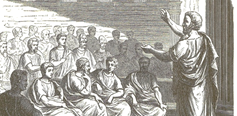Liberal pundits attack the reliability of the book of Genesis; for, they say, who was there to write down the opening chapters? (Answer: God told Adam, and he took it from there.) Conservative Christians informed by research on this topic understand and recognize oral tradition (different from oral transmission) was the mechanism used to preserve at least two books of the Bible — Genesis and Job — until Moses captured humanity's earliest records. Genesis reveals history in the present tense, as expected of contemporary witnesses to local events. Oral tradition is extraordinarily reliable, and some scholars have declared that it can be more reliable than written tradition. It is far from the anachronistic example of kids playing "telephone" around the backyard grill on a sunny day in June, where one whispers something in somebody's ear and what comes out five people later is totally different.


Oral tradition wasn't the game of telephone (left). It was a formal process of intense memorization by a select group who keenly valued accuracy (right).
Oral tradition is not something Christians invented; in fact, both Romans and Jews had a very long and well-established process of oral tradition. A select group were held responsible to memorize a particular narrative (in the case of the Jews, Moses' covenant). Accuracy was keenly important. They would commit it to memory, into their heart. As they repeated it, others would correct it; and thus, it became a living record.
Jewish families were commanded to do such in the covenant itself: Hear, O Israel: The LORD our God is one LORD: And thou shalt love the LORD thy God with all thine heart, and with all thy soul, and with all thy might. And these words, which I command thee this day, shall be in thine heart: And thou shalt teach them diligently unto thy children, and shalt talk of them when thou sittest in thine house, and when thou walkest by the way, and when thou liest down, and when thou risest up. (Deut 6:4-7,12). Joshua was told this book of the law shall not depart out of thy mouth; but thou shalt meditate therein day and night. Solomon exhorted his son forget not my law; but let thine heart keep my commandments ° write them upon the table of thine heart. God emphasizes hearing, memorizing and retaining His Word.
Memory was exercised far more in the ancient world. Jewish rabbis memorized entire books of the Old Testament if not all of it, and Jewish education consisted of rote memory. Why else would Paul sit at the feet of Gamaliel, if not to hear what he said? Many of Rome's philosophers and leaders were capable of incredible feats of memory. "Plato says that the Sophist Hippias of Elis could repeat 50 names after hearing them only once. Pliny the Elder reports that Cyrus was able to name every man in his army!" Compare that to today's modern adult who uses his listening skills sparingly with 25% accuracy. [1]
Returning to the book of Genesis and its reliability, some have questioned the patriarchs' long lifespans. Curiously, ancient Sumerian documents noted that King (En)-me-bara-gisi reigned 900 years. The king was known to be truly historical as archaeologists discovered inscriptions bearing his name. There are multiple traditions of Noah's flood across many societies, ranging from the Orient to the Middle East. Shared memories are proof of the reliability of the Old Testament. [2]
By the time you get to the 12th chapter of Genesis with Abraham in the era of the patriarchs (2000-1600 BC), we have plentiful historical records. All of the data during this era aligns with Old Testament history extraordinarily well. For instance, when scholars compare people's names from Genesis to extra-biblical records of the same era, their frequency of use and style are statistically consistent with those time periods – meaning, Moses did not invent history. Should it really surprise us that God's word has been faithfully preserved, and thus is accurate and reliable? Indeed, the words of the LORD are pure words.
Like this? Consider sharing it to Facebook by clicking the linked icon below.
